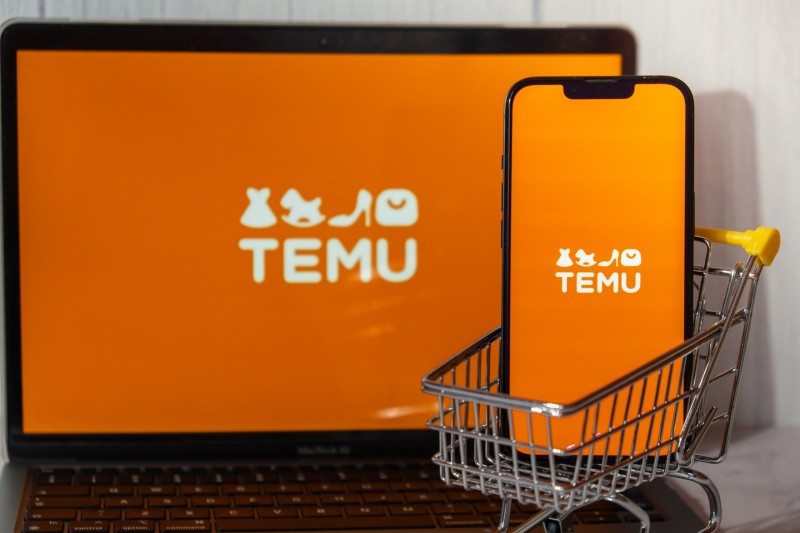
http://info.afrindex.com
China-Africa Trade Information Service

http://info.afrindex.com
China-Africa Trade Information Service
 image from Moroccoworldnews
image from Moroccoworldnews
Beni Mellal - Shoes for under $3, electronics for just a few dollars - you may have seen the eye-catching ads on social media recently for Temu, a new online shopping platform that has taken Morocco by storm in recent months with its seemingly unbelievable rock-bottom prices.
But the Chinese-owned e-commerce app’s meteoric rise has also been accompanied by swirling controversy over issues like data privacy and the long-term impact on local retailers.
Temu, which launched in the North African kingdom earlier this year, offers a vast array of deeply discounted products ranging from clothing and cosmetics to home goods and gadgets.
Its ultra-low prices - with some items like earbuds selling for as little as MAD 20 ($2) - and slick marketing have quickly made it a viral sensation, skyrocketing to the top of app store charts.
But even as millions of deal-hungry Moroccans flock to Temu to score unbeatable bargains, the app’s rapid ascent has raised eyebrows and sparked heated debate on social media over whether this e-commerce upstart is too good to be true. At the center of the controversy are growing fears over how Temu handles users’ personal data and its potential to disrupt Morocco’s retail sector.
For shoppers, using Temu is a straightforward process. After downloading the app and creating an account, users can browse its extensive catalog of heavily discounted goods, place orders, and have items shipped directly from manufacturers, typically in China. Temu facilitates the entire transaction and provides order tracking.
To keep prices ultra-low, Temu utilizes a data-driven business model it calls “Next Generation Manufacturing” or NGM. This approach reportedly optimizes production based on consumer preferences while eliminating hidden costs and inefficiencies. Resulting savings of over 50% are then passed on to customers.
While there’s no hard evidence that Temu shares user data with the Chinese government, the app’s data collection practices have come under scrutiny, especially after the temporary suspension of its sister site Pinduoduo by Google over malware concerns. Some officials in the US, where Temu is also popular, have accused it of being linked to “foreign adversaries.”
However, analysts have noted that Temu appears to be less aggressive in gathering user data compared to Pinduoduo. The app also currently tops both Google and Apple’s app stores and was even featured as an “Editors’ Choice” on Google Play, signaling it is seen as a trusted platform. Still, experts advise users to carefully review what personal information Temu collects.
The activity of apps like Temu requires authorities to step in and regulate their operations, ensuring that users’ personal data is not being misused for other purposes. Most foreign apps active in Morocco do not reveal where their servers are located, making it unclear what happens to Moroccan customers’ private information.
Temu’s rock-bottom prices have proven extremely enticing for Moroccan consumers, but traditional retailers worry the app’s rise could seriously eat into their bottom line if shoppers get hooked on its unbeatable deals.
According to social media commenters, the app has advantages and also disadvantages that could primarily harm Morocco’s poor and middle class, who will become addicted to e-commerce and find themselves paying large sums for useless things.
However, some wholesalers seem less concerned, believing Temu may actually boost the e-commerce sector overall in Morocco. By offering such low prices, the app could help familiarize Moroccans with e-commerce and overcome reservations that have held them back from embracing it. Some wholesalers believe that after shopping on Temu, customers will ultimately come back to local retailers.
As with any online platform, the quality and authenticity of products on Temu can be hit-or-miss given the wide range of third-party sellers. The company encourages users to carefully review item descriptions, customer feedback, and vendor ratings before purchasing.
Temu does offer some buyer protections. Its Purchase Protection Program provides refunds if items don’t match the listing, arrive damaged, or are not delivered within 90 days. The company also has a customer service department to handle inquiries and issues with orders.
As Temu’s viral growth continues unabated, the controversies surrounding the app show no signs of slowing down either. Observers say regulators will likely keep a close eye on the platform, particularly its data practices and claims of rock-bottom prices, to ensure compliance with local laws.
At the same time, Temu’s ability to offer unbeatable deals could reshape Morocco’s e-commerce landscape and consumer habits for years to come, for better or worse. While some celebrate the app for making online shopping more accessible, critics worry its rise may come at the expense of personal privacy and local businesses.
As one social media user put it, “Moroccans now find themselves torn between the temptations of very low prices and their personal data, which seems to have entered digital labyrinths with no way out.”
Only time will tell how Temu’s story will unfold, but one thing is certain: this Chinese-owned upstart has undeniably made a major splash in Morocco’s burgeoning digital economy. As consumers continue flocking to its unbeatable bargains and debate rages over its societal impact, Temu looks poised to remain a major e-commerce player in the kingdom - and a newsmaker - for the foreseeable future.